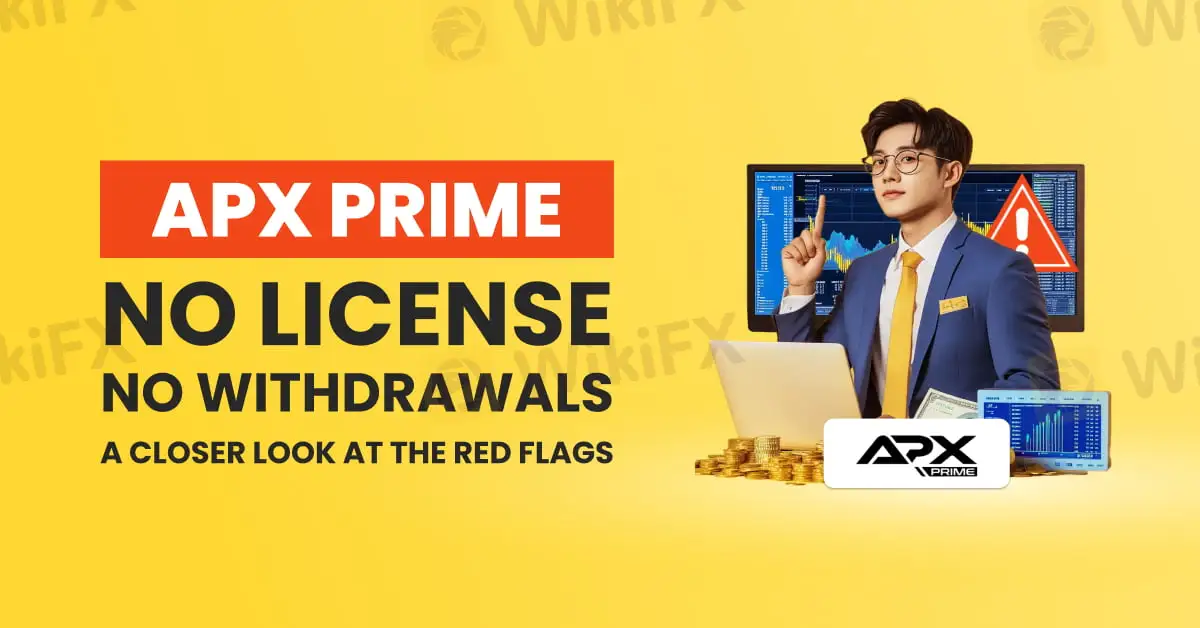APX Prime: No Regulation, No Withdrawals? A Closer Look at the Red Flags
Abstract:With no valid license, a questionable registration in Saint Vincent and the Grenadines, and unresolved client complaints, APX Prime presents risks that traders cannot afford to ignore.

In a market saturated with online trading platforms, regulation is often the only barrier separating reliable brokers from risky operators. In the case of APX Prime, several red flags appear upon even a basic background check. This broker currently holds no valid financial regulatory license, raising immediate concerns about client fund security, compliance standards, and operational transparency.
Despite promoting its services globally, APX Prime is registered in Saint Vincent and the Grenadines, a jurisdiction often criticized for having minimal oversight of forex and CFD brokers. The lack of meaningful regulatory enforcement in this region allows entities to operate with fewer requirements regarding audits, capital reserves, or dispute resolution frameworks.
According to WikiFX, a global broker regulatory query platform, APX Prime holds a WikiScore of 2.11 out of 10, based on evaluations across various dimensions such as licensing status, platform stability, risk management, and business integrity. This places APX Prime among the lower-scoring brokers on the platform.

Client feedback also raises concerns. One trader from Chile reported that APX Prime had failed to process a withdrawal request initiated in March 2025. Despite repeated attempts, the trader stated that the broker had neither approved the wallet nor refunded the initial deposit. The experience was summed up as: “Avoid APX Prime if you dont want to lose your money.”

Similarly, a trader from Singapore submitted a complaint noting that a withdrawal request made on 13 December 2024 had yet to be fulfilled, months after the original submission. No clear communication or resolution has been reported.

The absence of a valid license means that APX Prime is not bound by any enforceable obligations to segregate client funds, adhere to financial reporting standards, or provide any investor protection mechanisms. This lack of regulation makes it difficult for traders to seek recourse in the event of disputes, loss of funds, or operational failures.

Operating from Saint Vincent and the Grenadines does not inherently indicate misconduct, but it is worth noting that this region does not supervise forex or CFD brokers, and the Financial Services Authority (FSA) there has repeatedly emphasized that it does not issue trading licenses for such activities. Brokers based in this location often rely on offshore flexibility, which in some cases comes at the cost of transparency and accountability.
Traders are strongly advised to exercise caution before engaging with APX Prime. The lack of regulatory oversight, coupled with client reports of delayed or denied withdrawals, poses significant risk. While the platform may appear functional on the surface, the absence of safeguards raises important questions about fund security and ethical operations.

Read more

Investing Capital in Focus as Complaints on Withdrawal and Other Issues Mount
Explore this guide we have exposed Investing Capital, which has mounted concerns for traders by disallowing withdrawals and making them lose their hard-earned money.

4 Warning Signs That Indicate You May Get Scammed in Your Forex Investments
In this blog, we will share with you a guide telling you about the tactics fraudsters employ to dupe investors.

Global Brokers Vs. Indian Rules: Why They Struggle in India
RBI issued a warning last year against 75 forex brokers. Those brokers are globally popular and regulated in other countries, but they are banned in India. Only few brokers even have physical offices located in India. So, why do global brokers face so many challenges in entering the Indian market?

Aetos: A Closer Look at Its Licenses
With multiple regulatory entries and one license now revoked, Aetos stands as a broker requiring closer scrutiny from investors, particularly those prioritizing license scope and jurisdictional compliance.
WikiFX Broker
Latest News
Capital.com Strengthens UK FinTech Ties with Key Memberships
10-year Treasury yield ticks higher as investors eye jobs report
Elon Musk's xAI raises $10 billion in debt and equity as it steps up challenge to OpenAI
Crypto Craze Fizzling Out? Here is Why
Public companies bought more bitcoin than ETFs did for the third quarter in a row
Stock futures are flat after investors sell tech names to start the second half of 2025: Live updates
Social Trading Goes Mobile at M4Markets
ACY Securities Expands Crypto CFD Offering with 24/7 Trading Access
Revelation: Makeup Artist, Social Media Influencer Involved in INR 1.62 Cr Forex Trading Scam
European Central Bank's tightening cycle is done,' chief economist says
Rate Calc

